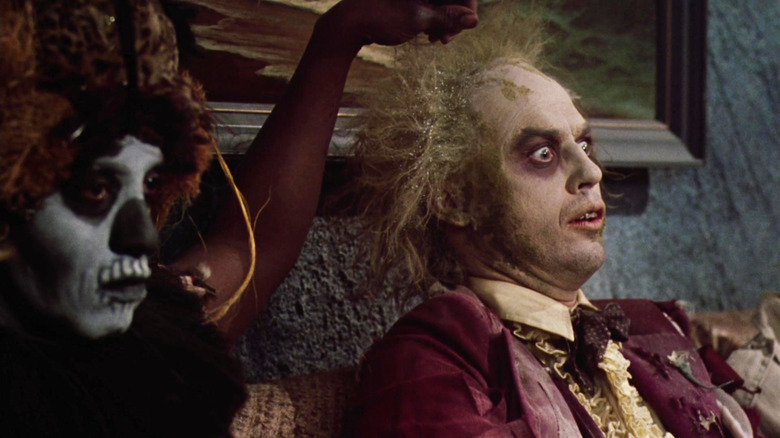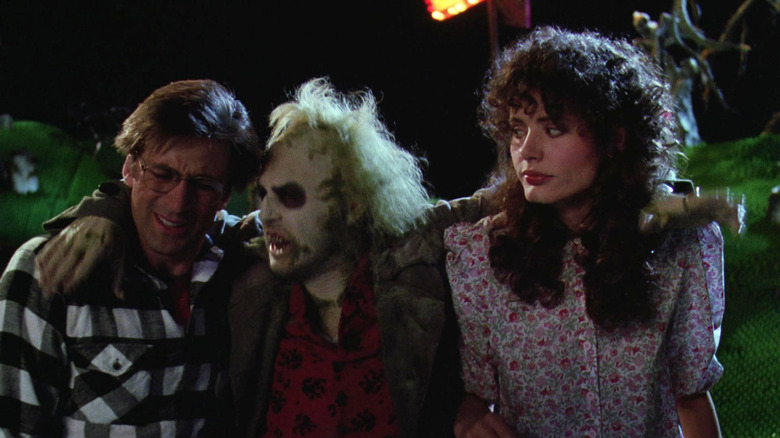We may receive a commission on purchases made from links.
What’s in a name? That which we call a rose by any other name would smell just as sweet, but a bad title can seriously damage a movie’s prospects at the box office. Just look at “Edge of Tomorrow,” a great Tom Cruise sci-fi action thriller whose generic moniker (itself a far cry from that of its source material, the far cooler-sounding Japanese light novel “All You Need Is Kill”) no doubt hurt its commercial performance. In fact, Warner Bros. even went so far as to redub the 2014 film “Live Die Repeat” upon its home market release.
As it just so happens, the studio nearly shot itself in the foot when it came time to name “Beetlejuice” almost 30 years before that. The title of the Tim Burton-directed 1988 horror-comedy classic is a play on the name of Michael Keaton’s antagonist, a pesky poltergeist who calls himself Betelgeuse after the supergiant star in the Orion constellation. Indeed, Keaton’s mischievous ghoul makes such an impression that it’s easy to forget just how little of the film he’s actually in (a mere 17 out of 92 minutes). More than that, “Beetlejuice” is just one of those titles that instantly grabs your attention; it’s indicative of the movie’s personality, a strange brew of Goth mayhem and wholesomeness that would come to define Burton’s career.
In the book “Burton on Burton” (edited by Mark Salisbury), Burton recalled butting heads with WB executives who wanted the film to be “more literal” during the scripting process. This is also what made the movie’s success so satisfying for him; as the filmmaker put it, “[…] [T]he thing I was most gratified about was that audiences could go along with something that didn’t follow what you’re constantly getting hammered into your head by the studios, which is: it’s got to be literal.” Burton’s battle with the studio didn’t end there though; the title of “Beetlejuice” was also a major sticking point for the same reason.
The (House) Ghost With the Most
You’ve heard of “Waiting for Godot,” now how about “Waiting for Beetlejuice”? Keaton’s titular specter doesn’t even show up until almost a half-hour into the film. Instead, most of the first act focuses on recently-deceased married couple Adam and Barbara Maitland (Alec Baldwin and Geena Davis) as they find themselves forced to share their home with its new living occupants — an eccentric band of New Yorkers who are worlds apart from the quaint New Englanders. Somewhat infamously, in his two-star review of the movie, the late, great Roger Ebert bemoaned that “Beetlejuice” wasn’t simply about the Maitlands’ day-to-day life in their small home town of Winter River, Connecticut. If anything, he seemed annoyed to realize the film was really about a bunch of ghosts.
While others, obviously, felt differently about the movie, it appears WB was concerned about reactions similar to Ebert’s during the test screening process. This, in turn, led the studio to pressure Burton into retitling the film “something more benign,” as he put it in “Burton on Burton” — and in this case, “benign” apparently meant very literal. “They wanted to call it ‘House Ghosts,’ and it came very close to being changed,” Burton recalled. “I was at a meeting and they said, ”Beetlejuice’ doesn’t test, but ‘House Ghosts’ is going through the roof.'” In response, Burton joked they should call it “Scared Sheetless” instead. Much to his horror, WB apparently took this seriously and gave real consideration to the idea, right up until “I said I’d jump out the window,” the director added.
“House Ghosts” certainly doesn’t stick in your noggin the way the B-word does. If anything, it feels unpleasantly corporate, like something that did well with test groups … because it did. Tellingly, Burton’s 2024 sequel “Beetlejuice Beetlejuice” begins with the original movie’s now-middle-aged goth heroine, Lydia Deetz (Winona Ryder), hosting a tacky paranormal talk show called “Ghost House” in what feels like a jab at WB’s alternate title for “Beetlejuice.” It seems Burton’s anti-authoritative streak is still alive and well (unlike many of the sequel’s characters)




